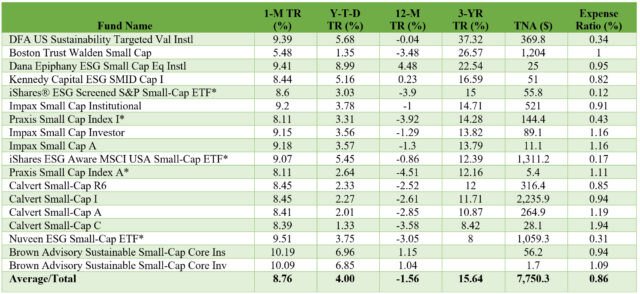The Bottom Line: After rallying recently, sustainable small-cap mutual funds and ETFs may still have upside potential, but the number of investment options is limited.
Selected sustainable small cap funds: Performance results to November 30, 2023, net assets and expense ratios Notes of Explanation: Funds listed in descending order based on 3-year trailing performance results. Selected list of sustainable small-cap funds exclude small sized funds, or funds with assets under management below $25 million, thematic funds, and, with one exception (Brown Advisory Sustainable Small Cap Core Investment funds that were launched in September 30, 2021 and have delivered strong performance results), funds with a track record under three years due to strategy shifts, in particular due to the adoption of sustainable investing or modifications to sustainable investing approaches. Sources: Morningstar Direct, Sustainable Research and Analysis LLC.
Notes of Explanation: Funds listed in descending order based on 3-year trailing performance results. Selected list of sustainable small-cap funds exclude small sized funds, or funds with assets under management below $25 million, thematic funds, and, with one exception (Brown Advisory Sustainable Small Cap Core Investment funds that were launched in September 30, 2021 and have delivered strong performance results), funds with a track record under three years due to strategy shifts, in particular due to the adoption of sustainable investing or modifications to sustainable investing approaches. Sources: Morningstar Direct, Sustainable Research and Analysis LLC.
 Notes of Explanation: Funds listed in descending order based on 3-year trailing performance results. Selected list of sustainable small-cap funds exclude small sized funds, or funds with assets under management below $25 million, thematic funds, and, with one exception (Brown Advisory Sustainable Small Cap Core Investment funds that were launched in September 30, 2021 and have delivered strong performance results), funds with a track record under three years due to strategy shifts, in particular due to the adoption of sustainable investing or modifications to sustainable investing approaches. Sources: Morningstar Direct, Sustainable Research and Analysis LLC.
Notes of Explanation: Funds listed in descending order based on 3-year trailing performance results. Selected list of sustainable small-cap funds exclude small sized funds, or funds with assets under management below $25 million, thematic funds, and, with one exception (Brown Advisory Sustainable Small Cap Core Investment funds that were launched in September 30, 2021 and have delivered strong performance results), funds with a track record under three years due to strategy shifts, in particular due to the adoption of sustainable investing or modifications to sustainable investing approaches. Sources: Morningstar Direct, Sustainable Research and Analysis LLC. Observations:
- Small cap stocks and funds have suffered a 12-month period of substantial underperformance, driven by higher interest rates. That said, a case is being made that small cap stocks could be primed for a significant comeback. Indeed, the stocks of smaller companies have experienced a rally recently. Since reaching a 2023 low on October 27th, the Russell 2000 Index is up 24.3% (price only) through December 22, 2023. Based on their attractive valuations relative to large-cap stocks, small caps still have upside potential.
- Investors interested in pursuing the small cap investing opportunity via the available universe of sustainable small cap funds segment, however, are restricted to a limited number of investment company choices across the blended, growth and value continuum. The sustainable funds segment, as defined by Morningstar, includes 21 active and passively managed mutual funds as well as ETFs, 41 funds/share classes in total, with $8.3 billion in assets under management as of November 30, 2023. After screening these funds to exclude small sized funds, or funds with assets under management below $25 million, thematic funds, and, with one exception, funds with a track record under three years due to strategy shifts, in particular as a result of the adoption of a sustainable investing approach or modifications to an existing sustainable investing approach, the segment narrows to 11 mutual funds and ETFs. These consist of seven actively managed funds and four passively managed funds.
- The four passively managed funds feature the lowest expense ratios, ranging from 12 basis points charged by the iShares ESG Screened S&P Small-Cap ETF (XJR) to 43 bps levied by Praxis Small Cap Investor Fund (MMSIX). Actively managed funds charge higher fees, ranging from DFA US Sustainability Targeted Value Institutional Fund’s (DAABX) 34 bps to a high of 1.94% charged by Calvert’s Small-Cap Fund C (CSCCX). Further, research measuring the performance of actively managed funds against their index benchmarks worldwide shows that they don’t often outperform. In the case of small cap funds, the same research indicates that a larger percentage of actively managed small cap funds have underperformed over the previous three and five years, but this is less so the case over longer time intervals. As for the latest year through June 30, 2023, only 26.6% of funds underperformed the S&P 600 Small Cap Index. So, the basis for choosing an actively managed fund rather than an index fund is more compelling than it is for a fund investing in large cap stocks that are more widely covered, are more actively traded and tend to be more liquid, for example.
- Across the board, the selected segment of 11 funds posted average returns of 8.8% in November, 4% year-to-date, -1.6% over the trailing twelve months, and an average annual 5.6% over the trailing 3-years. Actively managed funds, which in some cases benefited from a value bent, outperformed index funds, on average, in November 2023, year-to-date and over the trailing 12-months and three years.
- Sustainable investing strategies across the selected universe of funds are dominated by funds that employ an ESG integration approach combined with fund screening. These approaches involve an evaluation of financially material environmental, social, and governance (ESG) factors that may affect a company’s revenues, expenses, assets, liabilities, and overall risk as part of investment decision making. In addition, funds are also subjected to ESG screening criteria, pursuant to which companies or industries with significant exposure to specific products, services or social and environmental concerns are excluded from the eligible investing universe. That said, implementation strategies vary and some, like the Calvert Small-Cap Fund, also employ a broad-based socially responsible strategy. Before investing, a very careful review of a fund’s sustainable investing approach is recommended.






